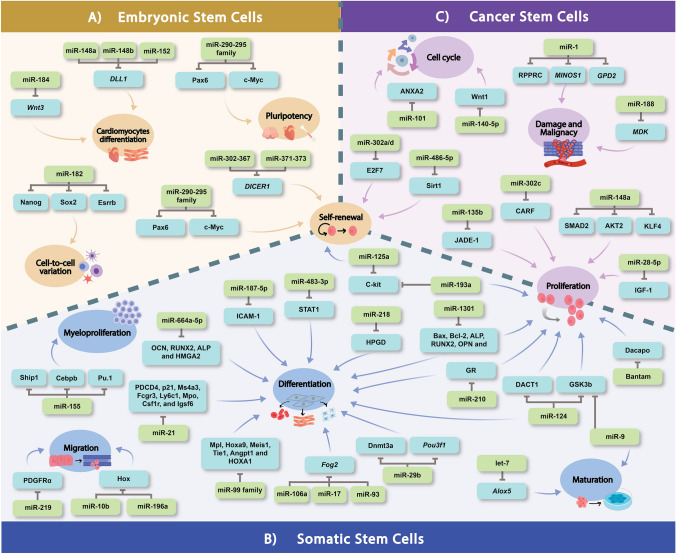Fig. 5.
A MiRNAs and the target gene interactions are reported to regulate embryonic stem cells’ biological processes. Cardiomyocyte differentiation is regulated by miR-184 a, b and miR-152 via targeting DLL1, and miR-184 through Wnt3 gene target. Pluripotency is reported to be regulated by the family miR-290–295 through gene targets Pax6 and c-Myc. Cell-to-cell variation was reported to be mediated by the interaction between Nanog, Sox2, and Esrrb genes targeted by miR-182. Self-renewal is reported to be mediated by miR-302–367 and miR-371–373 targeting the gene DICER 1, as well as by miR-290–295 family via targeting Pax 6 and c-Myc genes. B MiRNAs and the target gene interactions are reported to regulate somatic stem cells’ biologic processes. Myeloproliferation, differentiation, migration, maturation, proliferation, and self-renewal are the biologic processes regulated by different miRNAs and target gene networks in somatic stem cells, in which miR-125a and miR-93 share c-kit as a target gene, as well as miR-9 and mir-124 share the target gene GSK3b. MiR-210, miR-124 and miR-1301 target genes are involved in the regulation of more than one biologic process of somatic stem cells. C MiRNAs and the target gene interactions are reported to regulate cancer stem cells’ biologic processes. The cell cycle is a biologic process in cancer stem cells reported to be regulated by miR-101 and miR-140-5p via targeting ANXA2 and Wnt1 genes, respectively. Damage and malignancy are regulated by miR-188 via the MDK target gene and, by miR-1 through RPPRC, MINOS1, and GPD2 target genes. Proliferation is regulated by miR-135b, miR-302c, and miR-28-5p by targeting a single gene, while miR-148a regulates proliferation via targeting 3 different genes. Self-renewal is regulated by miR-302a/d and miR-486-5p through E2F7 and SiRT1 target genes, respectively

